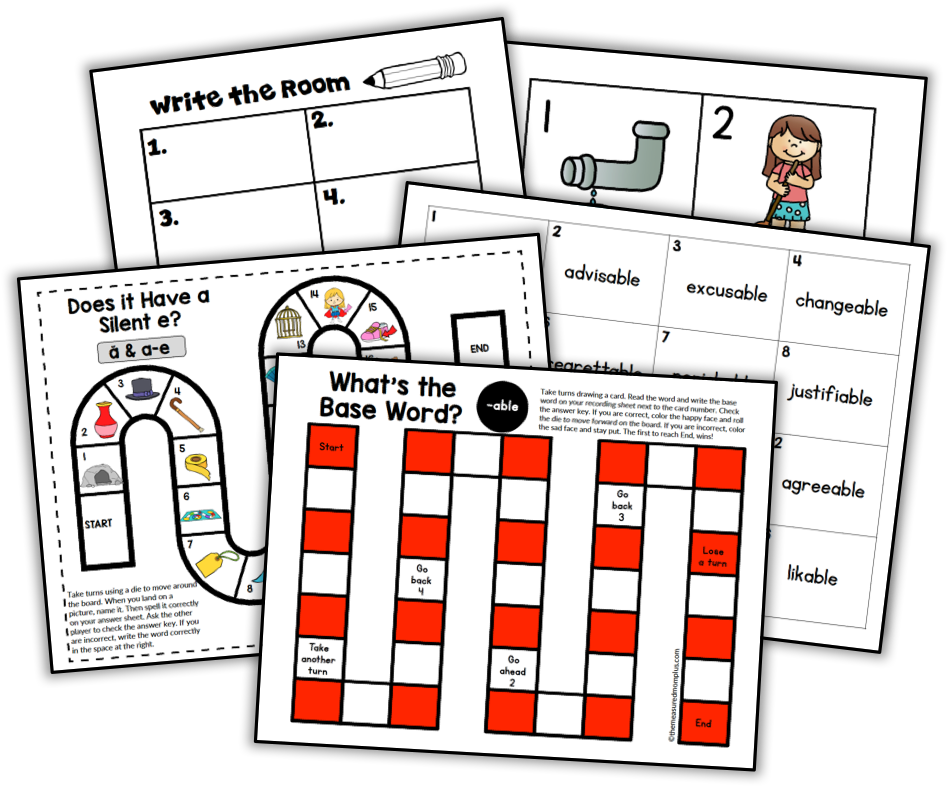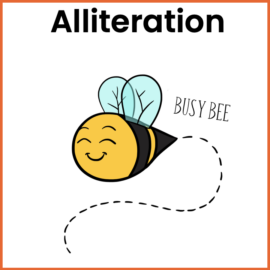It’s time for lesson 7 in the 12-part writing series between This Reading Mama and The Measured Mom. This week I’m sharing a strategy to teach first and second graders when they’re revising their work. How do we help young writers build vocabulary when their writing is full of the same old words? We put boring words in jail!

Simple Writing Lesson #7:
Put boring words in jail.
(a revising strategy)
(Note: I taught this lesson to my first grade daughter who is just beginning first grade. You can adapt it to use in other grades.)
When to use it:
When your student’s writing is full of the same old words. Like. Fun. Nice. Big. Happy. You want to expand your child’s writing vocabulary.
How to teach it:
1. Prepare your materials. You will need:
- a writing notebook for you and your child
- two writing utensils
- a set of children’s thesauruses
- a homemade paper “jail” (or if you’re a classroom teacher, a large paper display you can post at the front of the room)
- post-it notes
- a written sample you’ve prepared filled with “boring” words that you’ve observed in your child’s writing
- samples of writing your child has already done
2. Introduce the lesson. Here’s how it sounded at our house:
“Today we’re going to look at some of your old writing and make some changes so that it’s even better. One way good writers revise their writing is by changing some of the words. You see, there are some words that don’t know their place. They go everywhere at once and don’t stay put! These boring words are all over our writing – and more interesting words don’t get a chance to be used! Sometimes we just have to put these boring words away and use different words.”
3. Pull out the writing sample you’ve prepared and read it aloud. Here’s what it sounded like when I did this.
“Here’s something I’ve written – and you know what? A lot of those boring words found their way into my story! Listen.”
I like to go to the library. It has a lot of books! I like to read them. I love to see the new books they have. We have a big library. It’s fun to go there.
4. Put the boring words in jail! (You should know that I created my writing sample after I had read through my daughter’s writing and found words that she uses over and over. I used those same boring words in my story.)

“I see some words that I see in our writing waaay too often. Do you know where those words belong? In jail! We’re going to write them on post-it notes and put them inside this jail I made. Since they’re on post-it notes, we can take them out later and start using them again. But until they learn their place, they need to be locked up!”

I took out the paper jail I had made. You can make your own or get my free printable at the end of this post. To make the jail, I printed it and cut out the white spaces between the bars. Then I laminated it (to make a clear window), laminated a plain piece of paper, and taped them together with clear packing tape — just on one side, so that my daughter could open it to put the words inside.
“Here are some words we need to write on post-it notes and put away. Can you write them for me? Like. A lot. Love. Big. Fun. I have to cross these words out of my writing when you put them in jail – because they’re locked up! I can’t use them right now.”

5. Teach your child how to use a thesaurus to replace the boring words.
“Well, it’s great to have those boring words out of my writing, but now what? I have to put some other words there instead. That’s why I got these great thesauruses from the library. They’re full of interesting words that we can use to replace the boring ones.”

One by one, we looked up the boring words and chose replacements. Here are some things to keep in mind:
- Sometimes, the word you’re looking to replace is not in the thesaurus. We could only find “fun” used as a noun. So I looked up “enjoyable” instead, and we chose from that list.
- If you can’t find a word you like, choose a different thesaurus. It really helps to have a selection to choose from.
- Teach your child how to cross out the word and write the new word above it. If there’s no space, model how to draw an arrow and write the new word in the margin. Remember: DON’T ERASE. We want to see the progress that’s occurred – and when kids erase in their writing notebooks, we lose that history.
- Of course you can use a thesaurus app or online thesaurus instead of the paper copies. Personally, I think it’s good for kids to have the practice of finding words in an actual book – and to do learning separate from a screen. But it’s also beneficial to learn to use those other tools.

6. Be sure to reread the sentences when you replace the boring words. Other changes might be necessary.
“We changed like to enjoy. Let me read how it sounds now.”
I enjoy to go to the library.
“Oops! That sounds funny. Can you figure out how we need to change the sentence?”
“I like going to the library.”
“No, we don’t have to change back to the boring word. We can just change the words around it. Here we can write, I enjoy GOING TO the library.”
7. Open up your child’s notebook and look for old stories to revise. If you are just working at preparing one piece to edit and publish, you don’t need to go through the rest of the stories. But since the purpose of our lesson was to teach this skill well, I decided that we would work through several of her old pieces. I’ve shared two of them below.


Don’t worry if your child chooses a word that doesn’t quite fit. The important thing is that she is excited about trying new words and embraces the act of revising her writing. With time she’ll learn which words are the best choice.
8. Remember that those words are in jail! When your child writes a story on future days, she may need to pull out a thesaurus when she’s tempted to use a word that’s locked up. Eventually you may choose to take some of the words out of jail and put different words in.
Stay tuned for next week’s lesson, when This Reading Mama will share another simple writing lesson for the revision stage. To see all our lessons, click on the image below!







Pamela Coscia
You are amazing ! I appreciate all these interesting strategies, I am excited to try them with my new first graders.
How long do you spend on each strategy and have children practice before moving to next one to teach?
Thank You!!!
Pam
Anna Geiger
I would introduce them in a writing mini-lesson and observe how well the students use them on their own. I’m not sure that I would give a second lesson immediately, but would return to it as needed. I would talk about in individual writing conferences and revisit it in small groups if only a few students need review.
Jill
Putting boring words in jail is a novel idea to expand your vocabulary. This activity makes it easy and fun to change overused words out. Thank you for linking up this week to the Thoughtful Spot Weekly Blog Hop 🙂
Anna Geiger
As always, thanks for checking out my posts!
Kunashe
Welcome
Katie @ Gift of Curiosity
What a fun and cute idea! I would probably adapt this for some populations I’ve worked with (where lots of the kids have parents who are actually in jail) by putting the words in “time out” or the “trash” or something like that. But the concept is cute and effective for teaching kids to use more interesting words. Thanks for sharing!
Anna Geiger
Oh, wow, I never thought of that, Katie! This was not an issue in the places where I taught, and thankfully not in our home 🙂 A good point to remember!
pinkoddy
What a really great idea for stretching a child’s vocal, thank you.
Anna Geiger
You’re very welcome!
Christine M. (Cool Mom) - Tech Support for Stanley & Katrina
My 10 year old daughter (and writer) enjoyed this post. She thinks it is a great idea. Thanks for sharing with us!
Anna Geiger
I’m glad your daughter enjoyed it, Christine 🙂 Thanks for stopping by!
Chipenzi PS
Sweet it was great
Natalie
What a fun lesson. We definitely have some words there that belong in jail 🙂
Anna Geiger
Thanks for checking it out, Natalie! I’ve found that the visual works really well for kids.